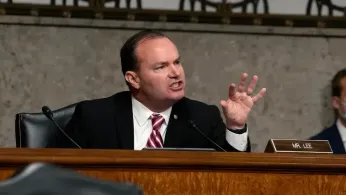
3 hours ago
GOP Senator Mike Lee’s Bid to Criminalize All Porn Nationwide Advances to Senate Committee
READ TIME: 4 MIN.
GOP Senator Mike Lee’s effort to federally criminalize pornography has taken a procedural step forward, with the Interstate Obscenity Definition Act (IODA) read twice and referred to the Senate Committee on Commerce, Science, and Transportation for review. According to public reporting, the referral occurred on Tuesday, August 5, following its introduction earlier this year.
The proposal would substantially redefine “obscenity” under the Communications Act of 1934 by expanding it to include material that “appeals to the prurient interest in nudity, sex, or excretion,” “depicts, describes, or represents actual or simulated sexual acts with the objective intent to arouse,” and “taken as a whole, lacks serious literary, artistic, political, or scientific value.” Under the bill, “a picture, image, graphic image file, film, videotape, or other visual depiction” that meets these criteria would be treated as criminal, sweeping up a broad array of visual sexual content online.
Senator Lee first unveiled the concept earlier this year amid a renewed push by some conservatives to restrict adult content online. Coverage of the bill’s introduction in May detailed provisions that, if enacted, could expose creators, distributors, and platforms hosting sexual content to federal prosecution, while potentially leaving consumers uncertain about legal exposure for possessing common forms of adult content.
In public statements at the time of introduction, Senator Lee argued that “hazy and unenforceable legal definitions” have allowed “extreme pornography” to reach children, positioning IODA as an update for the “internet age” to enable prosecution and removal of content deemed obscene. Parallel statements from House allies emphasized equipping law enforcement to target and remove such material online, framing the measure as a family-protection effort.
Media analyses have also linked IODA to the Heritage Foundation’s “Project 2025” policy blueprint, which includes calls to permanently criminalize pornography and has influenced conservative policy discussions during this election cycle. Reporting notes that the bill aligns with that playbook’s goals to restrict sexual content online via federal statute, marking a significant shift from the historically narrow, Supreme Court–defined category of obscenity that is not protected by the First Amendment.
Legal scholars and civil liberties advocates have long noted that the constitutional test for obscenity (often associated with the Supreme Court’s Miller test) has confined prosecutions to extreme cases, leaving most consensual adult pornography protected as free speech. By broadening the definition and removing intent safeguards for sharing “obscene” content, IODA could dramatically expand potential liability for creators, publishers, and platforms, as well as for routine online expression that includes sexual themes.
For LGBTQ+ communities, the implications are particularly acute. LGBTQ+ creators and sex workers, including transgender and nonbinary performers, already navigate payment processing hurdles, platform moderation bias, and sudden takedowns. A broadened federal obscenity standard could amplify these pressures, disproportionately endangering LGBTQ+ sexual expression and livelihood, given well-documented patterns of platforms over-moderating queer content when faced with legal risk.
Advocates also warn that such a law could chill educational and artistic work that includes sexual health information, safer-sex demonstrations, or depictions of consensual intimacy—resources that have been vital for LGBTQ+ people, especially youth, in the absence of inclusive school curricula. Because the bill’s operative terms hinge on “prurient interest” and perceived “intent to arouse,” critics argue the enforcement could be inconsistent, culturally biased, and vulnerable to viewpoint-based suppression, including of LGBTQ+ narratives.
The committee referral indicates the bill will next face staff analysis, potential hearings, and possible amendments before any further action such as a committee vote or placement on the Senate calendar. While committee referral is a standard early step for most bills, the move raises the stakes for stakeholders—from civil liberties groups to adult-industry representatives—who are expected to intensify outreach to lawmakers and submit formal comments or testimony should hearings be scheduled.
Outside Congress, coverage has highlighted how IODA could interact with platform liability and content moderation. If federal criminal exposure expands, major platforms may preemptively purge or geoblock content that could even arguably fall within the new definition, a pattern seen after other regulatory shifts targeting sexual content. This dynamic, advocates say, risks silencing LGBTQ+ intimacy, art, and erotica alongside commercial adult material, and could incentivize payment processors and hosting providers to withdraw services from LGBTQ+-led projects to avoid risk.
As the bill moves through the Senate committee process, LGBTQ+ and sex worker rights organizations are expected to monitor developments and mobilize community input. Observers note that any federal redefinition of obscenity would likely face immediate constitutional challenges, where courts would weigh the statute’s language against longstanding First Amendment protections for adult sexual speech.
For now, the measure’s advancement to committee formalizes the debate in Congress over how far federal law should go in regulating adult sexual content online, and whether such efforts can be squared with constitutional limits and the realities of digital expression—especially for marginalized communities whose voices have historically been policed.






